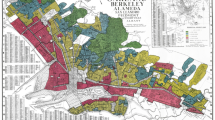Abstract
Dealing with mental health problems in the inner city presents a major challenge to planners and service providers. Traditional mental health service-oriented interventions often prove ineffective due to the complexity of individual's needs. This article argues that a population health framework can be used to identify critical risk and protective factors and facilitate more effective, upstream, population-based interventions for mental health problems in the inner city. A community report card is seen as a useful measure of key indicators at any point in time and of changes over time at the community or neighborhood level. A number of issues with regard to report card development are identified and discussed, as is the process of creating a report card, including key domains and the organization of findings.
Similar content being viewed by others
References
Federal, Provincial, and Territorial Advisory Committee on Population Health. Toward a Healthy Future: Second Report on the Health of Canadians. Ottawa, Canada: Minister of Public Works and Government Services; 1999. Available www.hc-sc.gc.ca. Date accessed: May 1, 2002.
Paykel ES. The evolution of life events research in psychiatry. J Affect Disord. 2001;62:141–149.
Heim C, Nemeroff CB. The role of childhood trauma in the neurobiology of mood and anxiety disorders: preclinical and clinical studies. Biol Psychiatry. 2001;49:1023–1039.
Institute of Medicine. Reducing Risks for Mental Disorders: Frontiers for Preventative Intervention Research. Washington, DC: National Academy Press; 1994.
Durlak JA. Common risk and protective factors in successful prevention programs. Am J Orthopsychiatry. 1998;68:512–520.
Cowen EL, Durlak JA. Social policy and prevention in mental health. Dev Psychopathol. 2000;12:815–834.
Commonwealth Department of Health and Aged Care Promotion, Prevention and Early Intervention for Mental Health—a Monograph, Canberra, Australia: Mental Health and Special Programs Branch, Commonwealth Department of Health and Aged Care; 2000.
Leviton LC, Snell E, McGinnis M. Urban health issues in health promotion. Am J Public Health. 2000;90:863–866.
Basrur S. The Path Ahead: a Report on the State of the City's Health—Toronto 2001. Toronto: Toronto Public Health; 2001.
Gordon R. An operational classification of disease prevention. Public Health Rep. 1983; 98:107–109.
Neugebauer R. Mind matters: the importance of mental disorders in public health's 21st century mission. Am J Public Health. 1999;89:1309–1311.
American College of Physicians. Inner-city health care. Ann Intern Med. 1997;126:485–490.
Zigler EF, Hall NW. Child Development and Social Policy: Theory and Applications. New York: McGraw-Hill, 2000.
Tremblay RE, Mâsse LC, Pagani L, Vitaro F. From childhood physical aggression to adolescent maladjustment: the Montréal prevention experiment. In Peters R DeV, McMahon RJ, eds. Preventing Childhood Disorder, Substance Abuse and Delinquency. Thousand Oakas, CA: Sage; 1996:268–298.
Vinokur AD, Schul Y, Vuori J, Price RH. Two years after a job loss: long-term impact of the JOBS program on reemployment and mental health. J Occup Health Psychol. 2000;5(1):32–47.
Fielding JE, Sutherland CE. National Directory of Community Health Report Cards. Chicago, IL: Health Research and Education Trust; 1998.
Simmes DR, Blaszcak MR, Kurtin PS, Bown NL, Ross RK. Creating a community report card: the San Diego Experience. Am J Public Health. 2000;90:880–882.
Canadian Institute for Health Information. Health indicators: 2002. Available at: www.cihi.ca/indicators/hltind.shtml. Date accessed: May 1, 2002.
Offord DR, Boyle MH, Campbell D, et al. One-year prevalence of psychiatric disorder in Ontarians 15 to 64 years of age. Can J Psychiatry. 1996;41:559–563.
Goering P, Lin E, Campbell D, Boyle MH, Offord DR. Psychiatric disability in Ontario. Can J Psychiatry. 1996;41:564–571.
Canadian community health survey. Available at: www.statcan.ca. Date accessed: May 1, 2002.
Lin E, Degendorfer N, Durbin J, Prendergast P, Goering P: Hospital Report 2001: Mental Health Joint Initiative of the Ontario Hospital Association and the Government of Ontario. Toronto: Hospital Report Research Collaborative; 2002.
Manuel D, Goel V. Hospital Report 2001: Mental Health Joint Initiative of the Ontario Hospital Association and the Government of Ontario. Toronto: Hospital Report Research Collaborative; 2002.
Health Canada. The population health template: key elements and actions that define a population health approach. Strategic Policy Directorate, Health Canada; 2001. Available at: www.hc-sc.gc.ca/hppb/phdd/pdf/discussion_paper.pdf. Date accessed: May 1, 2002.
Adlaf EM, Ialomiteanu A. CAMH Monitor 2001: Technical Guide. Toronto, Canada: Centre for Addiction and Mental Health; 2002.
Adlaf EM, Paglia A. Drug Use Among Ontario Students, 1977–2001: Findings From the OSDUS. Toronto, Canada: Centre for Addiction and Mental Health; 2001. CAMH Research Document Series No. 10.
Author information
Authors and Affiliations
Corresponding author
Rights and permissions
About this article
Cite this article
Strike, C., Goering, P. & Wasylenki, D. A population health framework for inner-city mental health. J Urban Health 79 (Suppl 1), S13–S20 (2002). https://doi.org/10.1093/jurban/79.suppl_1.S13
Issue Date:
DOI: https://doi.org/10.1093/jurban/79.suppl_1.S13




